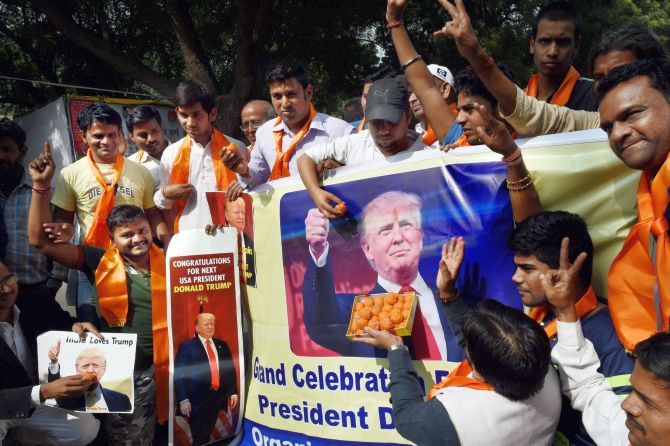'Trump's agenda is identical and India can rely on him to fight terrorism in all its forms, including Pakistan-sponsored outfits.'
Ambassador T P Sreenivasan on America's new president.

Wishful thinking at best and conspiracy at worst prevented an accurate assessment of Donald Trump's chances to win the presidency of the United States.
The mainstream media in the United States and elsewhere, several political leaders around the globe and almost all pollsters concluded that the experienced and well known Hillary Clinton would prevail over a man who knew nothing about things other than business and tax evasion.
On top of it, his suitability to become even a supermarket manager was challenged on account of his questionable moral character, neo-fascist tendencies and hatred of sections of the world population.
I expressed a contrarian view last September, not to praise Trump, but to look for straws of hope in the event of his becoming president.
'In the middle of September, barely two months before the polls, Clinton may have a slight edge over Trump but the matter is not settled as yet. Trump has begun to lead in critical battleground states like Ohio and Florida, where Clinton was leading till recently,' I wrote.
'If the Americans take a leap into the dark on account of their frustrations about the economy, terrorism and China, as the British did in the case of Brexit,' I noted, 'we may end up with Trump as president.'
'India has fewer reasons to be uncomfortable about such an eventuality than generally feared,' I said.
After Trump's stunning and convincing victory, fear is being expressed that he will lead his country to isolation, war and injustice to the poor.
His campaign speeches are being quoted to suggest that his presidency would be an apocalypse.
His acceptance speech should remove some fears as he said he would be the president of all the American people and a friend of all countries.
We should respect the democratic choice made by the American people and give Trump a chance to prove worthy of the trust.
Trump has a tendency to make an impact by saying the damnedest of things in the belief that any publicity is good as long as his name is spelt right.
He has already backed out of his vow to stop the migration of Muslims, build a wall between the US and Mexico and to stop spending money on NATO.
If he has come this far, he should have the wisdom to win friends and influence people for the sake of his country, which he has promised to make great again.
If he picks the right advisers and proceed with caution, he may become a good president.
As for the India-US relationship, it has been like a roller coaster ride, not because of the personalities involved, but because of geopolitical reasons and the positions taken by either country at different times.
The bipartisan support was its mainstay.
But the fact remains that the Republicans have tended to be more helpful to India in the past.
In the days following the nuclear tests of 1998, President Clinton and many close Democrat friends of India, even the chairman and members of the India Caucus in Congress, deserted us.
The state department was not on talking terms with us. It was a statement by former secretary of state Henry Kissinger that he could understand India's concerns as it was in a 'tough neighborhood' that changed the bleak atmosphere for India in Washington.
Though Hillary Clinton was once referred to as 'the senator from Punjab' by the Obama campaign (the then senator apologised via Rediff.com for that remark), there is no evidence of her having gone out of her way to favour India.
She maintained a friendly face towards India, but her concerns about China and Pakistan were all too evident during her term as secretary of state.
Barack Obama started off as a hot favourite in India, but appeared disillusioned after his visit in 2010, when he failed to win the nuclear and the fighter aircraft contracts.
His initial opposition to the nuclear deal did not stand in the way of its implementation, but he did nothing to begin nuclear trade with India.
The Khobragade incident was a symptom of the malady in India-US relations. Obama extracted a price for every step he took with Narendra Modi to take the relationship to greater heights.
Despite all his camaraderie with the Indian prime minister, he spared no occasion to lecture India on the merits of religious tolerance and nuclear fidelity.
Many tricky issues remain even as we call ourselves a major defence partner of the US. Obama's support for India's permanent membership of the UN Security Council and for membership of the Nuclear Suppliers Group turned out to be hollow.
Donald Trump is notoriously unpredictable, but his evolving positions may align with some of our concerns.
Terrorism is the recurring theme in every speech that Modi makes and that is a measure of India's most important preoccupation today.
Trump's agenda is identical and India can rely on him to fight terrorism in all its forms, including Pakistan-sponsored outfits.
'Pakistan is probably the most dangerous country in the world today. The only country that can check Pakistan is India,' Trump said in September 2015.
No Democratic president, not even Mrs Clinton, has taken such an unequivocal position on Pakistan and terrorism.
As a businessman, Trump has been an admirer of India to the extent of encouraging investment in India.
Two Trump Towers are being built in Mumbai and Pune in partnership with Indian entrepreneurs. He has gone on record as saying that after the installation of the Modi government, India has become a 'top place' for investment.
In January 2016, Trump complimented India for 'doing great' and expressed surprise that nobody was talking about it.
Since he puts his money where his mouth is, as president, Trump is likely to embrace India. As a businessman President who has pledged to bring prosperity to the US, he may find a valuable partner in Modi.
Trump's admiration for Russian President Vladimir Putin and his championship of Brexit may well be signs of his wanting to be different from others. But neither of these, even if taken to their logical conclusion, will hurt India's interests.
On China, Trump has been ambivalent. His main criticism about China is on trade and currency matters.
In fact, his anticipated 'trade war' with China could wipe out $420 billion off China's exports, according to Kevin Lai, a Hong Kong economist.
Trump has also had some good words to say about China, but his distrust of Beijing is obvious and he is not likely to act against our interests.
The Democratic party's optimism about China being a responsible nation that can be entrusted with looking after stability in South Asia is not likely to be shared by Trump.
The people of the United States have leapt into the dark by electing Trump as president on account of the deep frustration over the establishment represented by Clinton.
Trumpism, marked by 'nativism' was found attractive not only by the whites, but also the minorities, including Hispanics, whom Trump had criticised.
His declaration that he is a great fan of India and the Indian prime minister during the campaign need not be taken at face value, but there is no indication so far that he will be unfriendly to India.
Prime Minister Modi himself has expressed the hope that bilateral relations will reach a higher level during Trump's term.
Ambassador T P Sreenivasan, is a former Ambassador of India and Governor for India of the IAEA.
IMAGE: Hindu Sena activists celebrate Donald Trump's victory in New Delhi. Photograph: Subhav Shukla/PTI Photo











 © 2025
© 2025